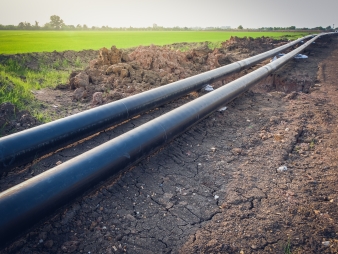A pipeline company has announced that it plans to build a pipeline that will cross your land and requests that you give it an easement, which is sometimes called a right of way.
You will keep your land and the company will pay you for the privilege. The company presents you with a form or model easement setting forth the terms and conditions of the easement and an offer of payment for the property rights you will be giving up. Is the offer fair and should I accept it? Rather than viewing the proposed payment as a final offer, you should consider the initial offer as a starting point in negotiations and bargain for the best deal possible. (Although not the topic of this article, the non-monetary terms of the easement are also subject to negotiation and are equally as important, if not more so, than the monetary terms.)
When determining just compensation for a pipeline easement each landowner’s unique circumstances are important to consider. However, there are two constants under Ohio law in determining value. First, the value of the land used for the right of way. The value will depend on the width of the easement and the breakdown between the permanent portion of the easement and the temporary portion used for construction. Second, the payment should compensate the landowner for any decrease in the overall land’s value attributable to having a pipeline running through the property. Will the pipeline run along the property line or does it cut diagonally through the property? The damage to the “residual value” of the property is also likely dependent on the character of the general land use in the area.
The easement itself will likely cover only a small percentage of your overall property. Typically, the pipeline company will agree to pay a set dollar amount per linear foot of pipeline that will be laid on the property. This amount typically amounts to what the property included in the easement would sell for if the land was sold outright to the pipeline company.
The pipeline company should also compensate the landowner for damages suffered as a result of the construction and maintenance of the pipeline. Such damages would include costs for repairing any damaged fences, repairing any damaged field tile, loss of the ability to grow crops on the land during the construction process, soil compaction and erosion, loss of timber, impact on water supply and interference with livestock, as well as for the inconvenience from the construction process.
The landowner is entitled to fair value for both elements of damage. Courts in Ohio define fair market value to be the amount a purchaser who is willing, but not required to buy, would pay and that a seller who is willing, but not required to sell, would accept, when both are fully aware and informed of all the circumstances involving the value and use of the property.
Often a private third-party appraisal may be desirable to assess the fair market value of what is taken and the damage to the residue. Appraisers can use a variety of methods to determine the value of your property, including comparing recent sales of comparable property and analysis of what potential buyers would pay for such property with and without a pipeline. The factors the appraisers consider can range from the predicted impacts on productivity and yields of future crops, to the impact on the price of the land because of the fear of injuries to person or property because of the pipeline. Because having a pipeline on the property may limit or prohibit commercial or residential development of the property, any appraisal should also take this into account.
The landowner should also consider the consequences if an easement is not given voluntarily. If the pipeline company has the power of eminent domain the landowner needs to consider the cost of litigation in an effort to increase the pipeline company’s offer. What is the net value to the landowner after litigation costs and expense if negotiations break down and litigation is necessary?
While the pipeline company’s compensation offer may seem straight forward, determining fair compensation for the property rights a landowner is surrendering can be a complicated process. So before you sign, consider talking to a professional.
Tagged In:EasementOil and GasPipeline




